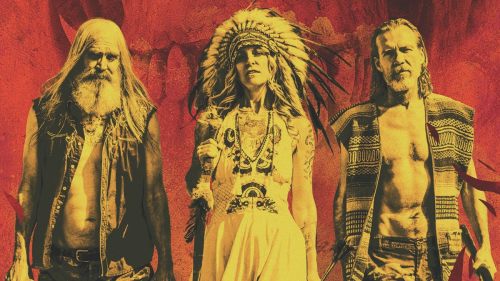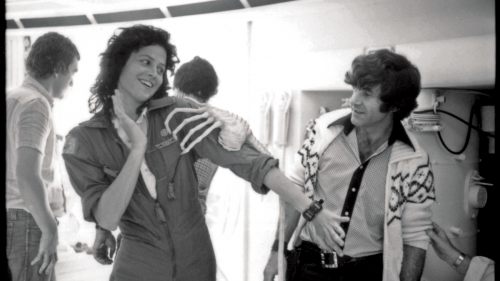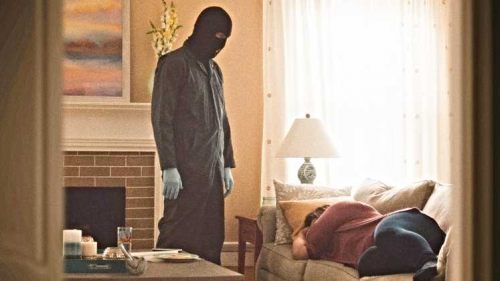Hail To The King: Larry Cohen Discusses A Lifetime In Genre Filmmaking
Larry Cohen is one of the greatest, most innovative filmmakers the screen has ever seen. The man's a lo-fi wizard who’s produced a few movies you’ve probably heard of before. Pictures like It’s Alive (’74), Q: The Winged Serpent (’82), and The Stuff (’85) wormed their way into horror and exploitation hounds’ brains by rejiggering tried and true subcategories - blaxploitation, Harryhausen creature features, slashers - into subversive slices of cinema that owned their creator’s unique worldview. If Steve Mitchell’s talking head/clip doc, King Cohen, is to be believed, the grindhouse auteur (who turns seventy-seven this summer) is still churning out ideas on the daily. He’s the “king of the logline”, able to sell a pitch to producers just by looking at a magazine cover moments before he walks into the room. He’s that good.
So, naturally, when I was offered the chance to sit down with Cohen and discuss his life's work, I jumped at the opportunity. What followed was a lengthy chat about genre filmmaking, and how young artists should approach making their own slices of schlock...
*****
Birth.Movies.Death: I've been watching your movies my whole life, and I always viewed the way that you packaged social issues inside genre movie trappings as radical and ahead of your time. Have you ever thought of yourself as being ahead of your time, in terms of your storytelling methods?
Larry Cohen: I think I was ahead of my time and still am, as a matter of fact. I mean, all the movies that I've made were reflecting what was going on socially in the country. Look at Bone ('72) - the first picture I ever made - which was about racism in America. I didn't realize when I made it in 1970, that 40 years later it'd still be very, very relevant. So, you're looking at that picture and it really deals with racism in America - which still exists, mind you. People are still being victimized, right and left. But what I'd ask myself is: "what's the essence of what's happening here? How does this work?"

The Stuff ('85)
BMD: How did that method apply to something like, say, The Stuff?
LC: With The Stuff, I wanted to make a picture that had something to say. Of course, people are still packaging products today which kill people, and then advertising them on television. It used to be cigarettes. But today, there's no cigarette advertising on television. It's all medicines, all pharmaceutical stuff. One after the other. And of course they tell you about the product and then they tell you the side effects. And usually one of the side effects is death. Sit and watch television all day long. You'll be exposed to 40 or 50 commercials for pills made of materials that are possibly very toxic to you. They don't give a damn, as long as they get your money. That's The Stuff. Buy the pill of your dreams, die happy. Only, instead of food, it's pills. It's all right there, waiting for you on television. You just make it entertaining.
BMD: Is that how you approach writing movies: concept first? Or do you invent a character first?
LC: I didn't want to make so called "message pictures". I wanted to make entertaining films that also carried something to say. So, I'd come up with a character - like the one that was in Q (played by Michael Moriarty) where we're following along with him as he discovers this monster, and then exploits it. Suddenly, it's a movie about exploitation, as opposed to a movie just about this weird con man. So, there's a bit of both.
You know, when I first started writing television, I wrote a series called The Defenders ('64), which was a very political series that dealt with all kinds of subjects that had been taboo for years, like abortion and stuff like that. For about two or three years, all my stuff was very political. Then I went ahead and created Branded ('65 - '66), which was about a guy I considered to be a Blacklisted cowboy. It became a Western about the Blacklist and McCarthyism during the '50s. Then you had The Invaders ('67 - '68), which was also about the Communist threat - or, at least, what was perceived to be the Communist threat - but they were all made to entertain people. I wanted tough guys, cowboys, and aliens, with a message. The idea of Communism infiltrating America was a joke, so we made that joke into more than one series.
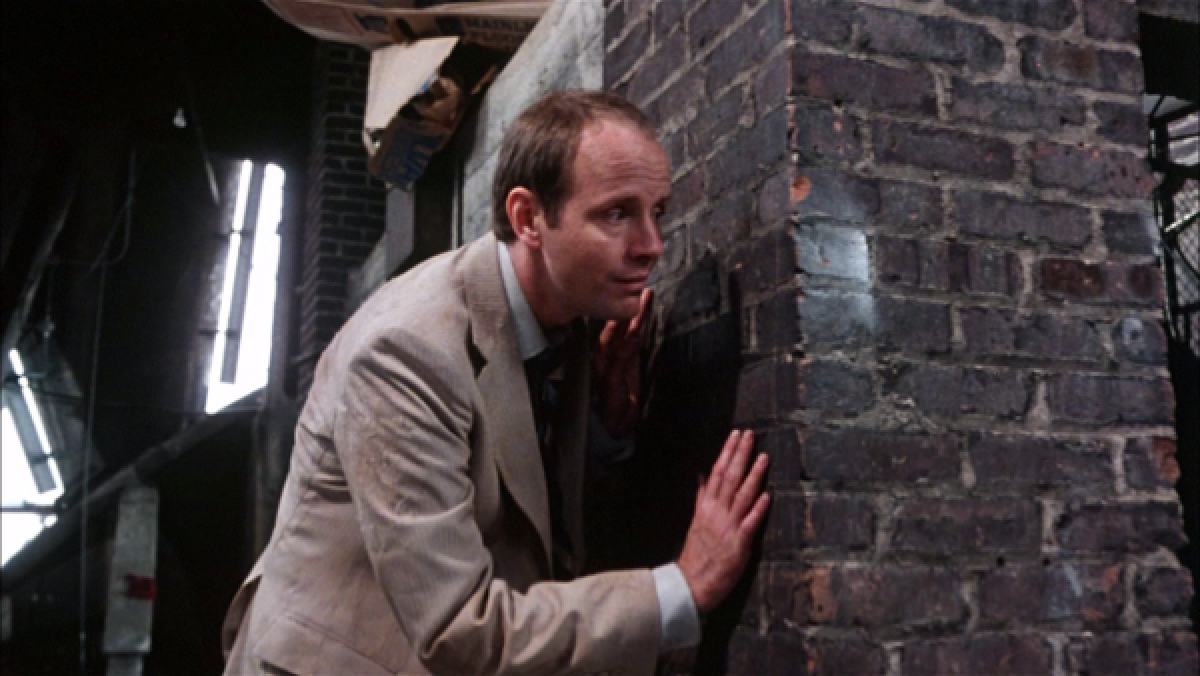
Michael Moriarty In Q: The Winged Serpent ('82)
BMD: You mentioned Michael Moriarty. With him, you sort of found your John Wayne, or your De Niro.
LC: He was a very difficult personality, and a lot of people didn't get along with him, and that's why he left the TV show Law & Order, where he was the star. He walked off the show at the height of its success, because he just decided he didn't like the people he was working with and left. But I was really lucky to have him.
BMD: Why do you think your working relationship together blossomed the way it did? How'd you click?
LC: I think it was our sense of humor. He appreciated my sense of humor, and appreciated the fact that I worked with him as a partner, rather than a boss. I didn't try to order him around or order anybody around. I managed to keep control through sheer force of creativity. I was always coming up with something new, something interesting for him to do. He was never bored when he was working with me because I was always inventing new things for him. The problem with most movies is when you get on the set, it's like factory labor. People come in the morning, they put on the costumes and the makeup, and then all day long they sit around and read magazines or books or play chess or cards or try to have sex with somebody in their trailer.
On my movies, everybody who's involved in the making wants to see what's happening next. There's so much improvisation and creativity going on that sometimes the actors show up on days when they're not even booked just to see what's happening. They didn't want to miss out on anything. I was always very flattered by that. It's a great atmosphere when you have people that are really enjoying the experience of making the picture.
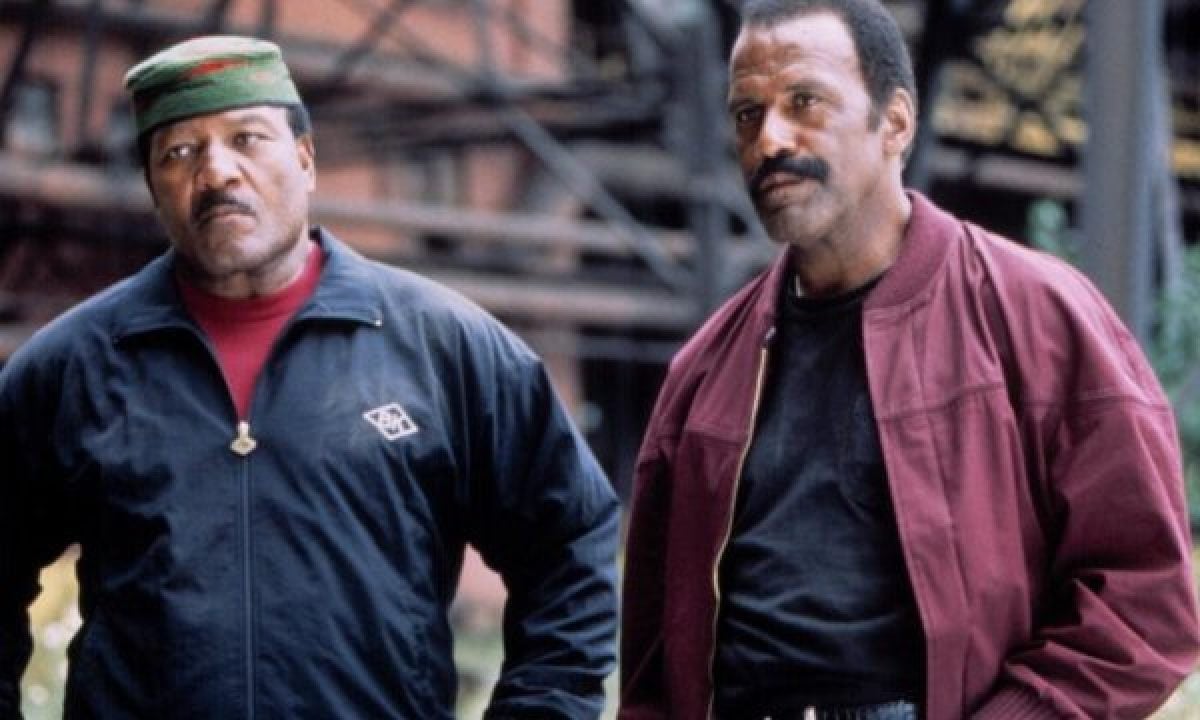
Original Gangstas ('96)
BMD: So, it's been 22 years since you made your last proper feature...
LC: Has it been that long? [laughs]
BMD: Original Gangstas is the last feature...unless you're counting your Masters of Horror episode (Pick Me Up ['06])...
LC: I started writing screenplays and selling screenplays for a lot of money. That's what I did instead of making pictures. I sold Phone Booth ('02) and about a dozen others for top dollar. I was getting more money for a script than I was getting paid for entire movies that I was making. So, I just decided I wasn't going to beat my head against the wall, because it was getting harder and harder to get these pictures played in theaters.
You see, every time I made a picture, they wanted to put it out on DVD instead of a theatrical run because theatrical was considered a big gamble. The studios were spending $20 - $25,000,000 to advertise a movie, so the smaller pictures I was making couldn't play in that poker game anymore. The stakes were just too high. I just said, "well I'm not going to make these movies then" because I didn't want people to just see them on DVD. I wanted them to see them in theaters, because that's where they belong.
BMD: What are you doing these days?
LC: Now I'm getting back into it to try and make films for Amazon or Hulu. I've got a package of 10 original thrillers that I wrote. They're all written already and they're fabulous scripts. Some of the best things I've ever written. The project's called Larry Cohen's High Concept, and every episode is worthy of being a theatrical feature. Each one, even though they're only going to be one-hour thrillers for cable. But that's what I'm hoping to do next.
BMD: Now, I wanted to ask you about a few movies in particular, if you don't mind. Some "deep cuts", if you will...
LC: Let's do it. [chuckles]

Black Caesar ('73)
BMD: Black Caesar always felt like a cornerstone of blaxploitation to me. Can you share any recollections about making that movie?
LC: Originally, I was hired to write a movie for Sammy Davis Jr., and I thought, "well, he's a little guy, like Cagney was. Maybe he could play a gangster." So, I wrote this thing for Sammy to play. He was supposed to pay me $10,000 for the treatment, but he never paid me. He said he didn't have the money. The Internal Revenue [Service] was giving him a hard time, so he had to have his people get him out of the deal.
Then Mr. [Samuel Z.] Arkoff from American International called me up and said that they were looking for an idea for a black audience. Since I had the treatment already written, I went down and made the deal with them the same day. Then we got Fred Williamson, who was perfect for the part. Once you added in the James Brown music, the film was just made, right there. It was a very exciting experience shooting in New York. We ran over all over the city, which is something we just couldn't do today, what with all the anti-terrorism and cameras up everywhere. It'd be just impossible.

Full Moon High ('81)
BMD: What about Full Moon High? I actually just got to see that for the first time, thanks to Scream Factory putting it out on Blu-ray.
LC: It looked pretty good too!
BMD: Yeah, it looks amazing. Where did that movie come from? Because it's like this combination of spy/werewolf comedy. It's a hilarious mash-up.
LC: I thought so, too. Everybody's always said to me, "why don't you do a comedy? You're such a funny guy on the set, and there's so much humor in your movies. Go do a comedy." So, we had the rights to I Was A Teenage Werewolf ('57), and I thought, "well, I'll do a comedy version of it." We had a wonderful array of comedians in the film. I mean, terrific actors were in the picture - including Alan Arkin and his son Adam. I had a really good time making that film.
BMD: You got a premier Ed McMahon performance in it as well.
LC: He was such a wonderful guy. Should've had a much better career in the movies. There he was on Johnny Carson every night, performing his butt off. Someone else needed to use him.

Special Effects ('84)
BMD: Now, onto one of my personal favorites: Special Effects...
LC: You know, that was the first script I ever wrote to direct, and I didn't get to do it at the time because I hadn't been a draw for a while. Then when the time came, some years later I got an opportunity to make movies for a company called Hemdale. One of those was called Perfect Strangers ('84), and the other one was Special Effects. I made them back-to-back with some of the same actors in both pictures.
Some of my best work is in those; great camerawork I thought, and a good performance from Zoë Lund. She'd been in Abel Ferrara's Ms. 45 ('81), but hadn't done much since. She was kind of a cult figure, and I put her in the film and she was very, very good. Funny thing is: on set, she was always carrying this script around in her purse, and was really protective over it. She was worried somebody might break into her apartment and steal the script. I kept asking her "you got another copy?" And, she said, "oh no, I couldn't have a copy made. They might make a duplicate and run off with it." Of course, the script turned out to be Bad Lieutenant ('92), which became a big picture that she wrote [again for Ferrara].
BMD: Whoa.
LC: The other main actor in it [Eric Bogosian], he was a big darling Off Broadway. He was an up-and-coming underground figure and he later worked on a movie called Talk Radio ('88), which Oliver Stone made out of the same play Eric had been in. He was wonderful for me in [Special Effects], but didn't think he was very good in the picture. Last year - when we ran the film in New York City - he came and had a different opinion of his performance. He actually thought he was pretty good after all these years.
BMD: The power of re-evaluation.
LC: Well, he had a past, you know? Everybody has a past. And I think that may have played into his original opinion.
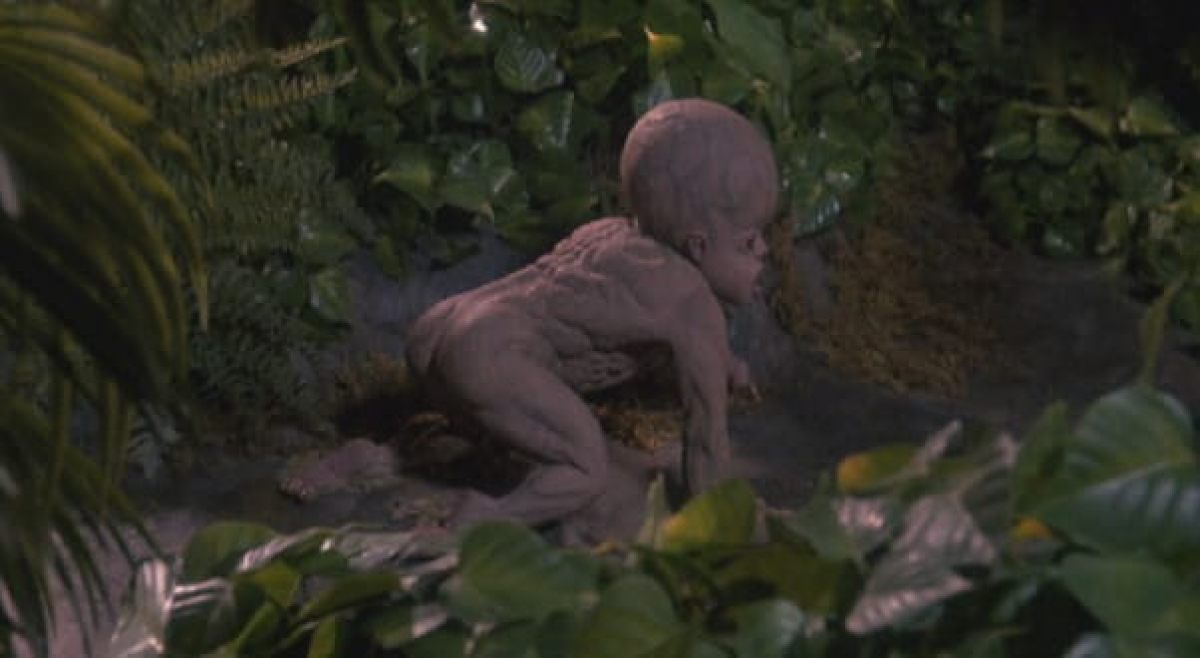
It's Alive III: Island Of the Alive ('87)
BMD: With It's Alive III: Island of the Alive, you shot that back-to-back with Return to Salem's Lot as part of a DTV deal, right?
LC: With Warner Bros. Yeah, that's right.
BMD: How the hell did that movie happen? Because you take this killer baby movie and then add this crazy John Huston adventure tone to it.
LC: Well, I didn't want to make the same picture over again. I mean, like you mentioned, it could've been the same picture that was made last time (It's Alive ['74]) and the time before that (It Lives Again ['78]). But I didn't want to make the same movie over again. If I was going to do another one, I wanted to come in with an entirely different approach. So, I used a kind of bizarre comedic approach. Naturally, since I had Moriarty in the lead, that meant we could do more of our craziness together. He was the man who had a monster child, but he approached his survival by turning it into a sick sense of humor where he would go and sell himself to people as the father of a monster. He even had a business card made up that said "Father of the Monster" and wrote a book. That's how he maintains his sanity, using this really sick joke. Plus, now the monsters were grown up in [Island of the Alive], so I had some fun making that film, particularly over in Hawaii where we shot a lot of it.

Samuel Fuller in A Return to Salem's Lot ('87)
BMD: Tell me about working with Samuel Fuller [who plays former Nazi hunter turned vampire killer Van Meer] in A Return to Salem's Lot...
LC: Well, Sam was a friend of mine and we got to be friendly because of the house that I live in on a couple of acres up here in Beverly Hills. It used to belong to Sam Fuller way back, like when he made The Steel Helmet ('51). So, when I ran into him at a party, I told him I own the house that he used to live in. He asked me if he could come by and bring his new wife. She'd never seen the house, you see. So, they came up and we became very good friends and we started seeing each other both in LA and later on in Paris, where he had moved. I spent a lot of time with him in Paris and wanted to do something for him. Like many filmmakers, he'd kind of outlived his money and things were getting rough for him and he wasn't getting any pictures to make anymore.
I say, "I want to write a part for you in a movie", and then when I showed it to him, he said, "my God, there's so much dialogue." I told him not to worry. "You'll get through it." And I was able to get him a nice salary and bring him over to New Hampshire, where we shot, and then to Vermont. He was exemplary. He never tried to direct the film. He was always there, supporting me in every way possible. And we were working enormous hours because it was a vampire movie and it had to take place at night. We were shooting all night long - from sundown 'til sunrise. The next day, we'd be up all night early and everybody else would be in shambles, but Sam would slip away without telling anybody, go back to the motel, take a shower, shave, put on a fresh shirt.
Since everybody else was weathered, they looked at this old guy and kept saying, "oh my God, he looks so fresh, so clean, so healthy, and we're complaining and he seems like he's just spruced up!" So nobody was complaining because he'd set such a fabulous example, and I loved him for that. He enjoyed doing the part. He said he liked the picture, which is very important to me. When he saw it, he did give me compliments on it. That's really what I was hoping I'd get. We maintained our friendship until the time he passed away. He was a lovely guy and full of fun, always with great stories to tell.
BMD: I always felt like that's one of your more underappreciated pictures, mostly because it's never really gotten a solid release...
LC: Well, those two pictures - It's Alive III and Salem's Lot - were contracted for a video release voucher. They did release them theatrically in a couple of locations. They didn't spend enough money on advertising and, if you don't advertise, you're not going to get any business. Say, if you don't spend 20 million bucks to advertise a movie, you don't get any visibility at all. So, if you're going to make a picture for $4,000,000, then you really gotta spend upwards of $20,000,000, but that's not a logical investment. Nowadays, the game is to pass everything onto the Internet or DVD or Blu-ray. You don't get the type of pictures I make anymore in theaters, because they don't make sense financially to studios.
BMD: If you were going to give today's young filmmakers a bit of advice, what would it be?
LC: I would say try to do something original. Do something that hasn't been done before. You know, when I go into a studio to pitch an idea to executives, the first thing they say is "what's it like?" And I say to them, "it's not like anything." If it's like something, I wouldn't have written it. That's what they should do. Make something that's not "like" anything.
King Cohen is in select theaters across the country now.

